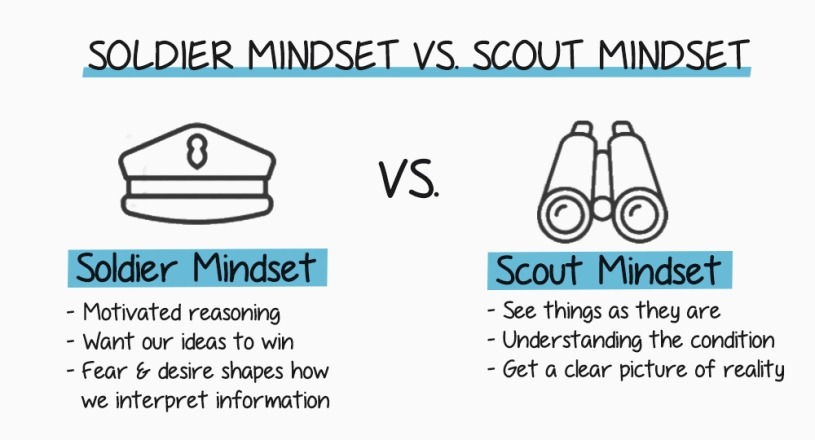The Scout Mindset And Scam Victims
By Tim McGuinness, Ph.D. – Anthropologist, Scientist, Director of the Society of Citizens Against Relationship Scams Inc.
A Curious Case Of Opposing Mindsets: Scout Mindset & Soldier Mindset
What Is The “Scout Mindset”
The scout mindset is a way of thinking that emphasizes curiosity, unbiased truth-seeking, and facing reality, even if that reality is unexpected. In the context of scam victims/survivors, we call these “realists.”
It is the opposite of the “soldier mindset”, which is a natural tendency to use motivated (biased) reasoning to defend one’s existing beliefs instead of being open to changing them. This is antithetical to scam victim recovery!
The scout mindset is named after the role of a scout in the military. Scouts are responsible for gathering information about the enemy and the surrounding environment. They need to be objective and unbiased in their observations, and they need to be willing to change their minds if new information comes to light.
In the same way, people with a scout mindset are willing to consider all sides of an issue and change their minds if they are presented with new evidence. They are not afraid to challenge their own beliefs, and they are always open to learning new things. (Or at least should be!)
The scout mindset is a valuable asset in any situation where it is important to make sound decisions. It can help people to avoid making mistakes, be more creative, and to be more adaptable to change.
Some mistakenly also call this the “explorer mindset” but it is not, since explorers often believe in magic and fantastical thinking to both set out into the unknown to make their discoveries! Explorers often allow their biases to lead them off a cliff.
Here are some of the benefits of having a scout mindset:
- You are more likely to make accurate decisions. When you are open to all sides of an issue and willing to change your mind, you are less likely to be influenced by your own biases. This can lead to more accurate decision-making.
- You are more likely to be creative. When you are not afraid to challenge your own beliefs, you are more likely to come up with new and innovative ideas. This can be helpful in a variety of situations, from solving problems to coming up with new products or services.
- You are more likely to be adaptable to change. When you are open to new information and willing to change your mind, you are more likely to be able to adapt to change. This can be important in a world that is constantly changing.
- You are more willing to collaborate with others. Because you are not afraid to listen to others you are better able to work in teams or groups.
There are many things that you can do to develop a scout mindset. Here are a few tips:
- Be curious. Ask questions and seek out new information. The more you know, the more objective you will be able to be.
- Be open-minded. Be willing to consider all sides of an issue, even if those sides do not align with your own beliefs.
- Be willing to change your mind. If new information comes to light, be willing to adjust your beliefs accordingly.
- Be aware of your biases. We all have biases, but it is important to be aware of them so that we can try to overcome them.
The scout mindset is a valuable way of thinking that can help you to make better decisions, be more creative, and be more adaptable to change. If you want to develop a scout mindset, start by being curious, open-minded, and willing to change your mind. This is essential for scam victims since it will determine their ability to manage their trauma and recover from their scam.
What Is The “Soldier Mindset”
The soldier mindset is a way of thinking that emphasizes defending one’s existing beliefs, even in the face of new information. It is the opposite of the “scout mindset”, which is a way of thinking that emphasizes curiosity, unbiased truth-seeking, and facing reality, even if that reality is unexpected.
The soldier mindset is named after the role of a soldier in the military. Soldiers are trained to follow orders and defend their country, even if they do not agree with the orders or the war. They are taught to trust their instincts and to be prepared to fight for what they believe in.
In the same way, people with a soldier mindset are often quick to judge and are not open to new information. They are more likely to defend their existing beliefs even when presented with evidence to the contrary. They are also more likely to see the world in black-and-white terms, with no room for nuance or gray areas. Those with this mindset are very unlikely to get the support and care they need to recover from scams.
The soldier mindset can be helpful in some situations, such as when making quick decisions in a dangerous or stressful situation. However, it can also lead to making bad decisions, especially when the situation is complex or requires critical thinking.
Here are some of the potential drawbacks of having a soldier mindset:
- You are more likely to make inaccurate decisions. When you are not open to all sides of an issue and unwilling to change your mind, you are more likely to be influenced by your own biases. This can lead to inaccurate decision-making.
- You are less likely to be creative. When you are not willing to challenge your own beliefs, you are less likely to come up with new and innovative ideas. This can be helpful in a variety of situations, from solving problems to coming up with new products or services.
- You are less likely to be adaptable to change. When you are not open to new information and unwilling to change your mind, you are less likely to be able to adapt to change. This can be important in a world that is constantly changing.
If you find yourself having a soldier mindset, there are a few things you can do to change your thinking:
- Be more open-minded. Try to consider all sides of an issue, even if those sides do not align with your own beliefs.
- Be willing to change your mind. If new information comes to light, be willing to adjust your beliefs accordingly.
- Be aware of your biases. We all have biases, but it is important to be aware of them so that we can try to overcome them.
- Be willing to ask questions. If you do not understand something, ask questions. The more you know, the more objective you will be able to be.
The soldier mindset is not always a bad thing in regular life, but for scam victims, it can mean that they are unable to recover and are very prone to listening to urban legends and false information that conforms with their existing beliefs. If you find yourself having a soldier mindset, try to be more open-minded and willing to change your mind. This will help you to make better decisions, be more creative, be more adaptable to change, and be open to accepting help when it is offered.
Aren’t These Just Cognitive Biases?
Yes, the “scout mindset” and the “soldier mindset” can be seen as two different cognitive biases. The scout mindset is characterized by curiosity, open-mindedness, and a willingness to change one’s mind. This mindset is associated with biases such as confirmation bias, availability heuristic, and overconfidence. Confirmation bias is the tendency to seek out information that confirms our existing beliefs and to ignore information that contradicts them. The availability heuristic is the tendency to judge the likelihood of something based on how easily examples of it come to mind. Overconfidence is the tendency to overestimate our own knowledge and abilities.
The soldier mindset, on the other hand, is characterized by a need to be right, a closed mind, and a fear of change. This mindset is associated with biases such as groupthink, motivated reasoning, and anchoring. Groupthink is the tendency for members of a group to make decisions that are not in their best interests because they are afraid of disagreeing with the group (we see this all the time in amateur anti-scam groups.) Motivated reasoning (biased reasoning) is the tendency to interpret information in a way that confirms our existing beliefs. Anchoring is the tendency to rely too heavily on the first piece of information we are given when making a decision.
While the scout mindset and the soldier mindset are different, they are both cognitive biases that can lead us to make bad decisions. The best way to avoid these bias traps is to be aware of them and to take steps to mitigate their effects. This can be done by seeking out information from a variety of sources (especially authoritative sources such as SCARS on www.RomanceScamsNOW.com, by being willing to consider alternative viewpoints, and by being open to changing our minds when presented with new evidence.
The Scout Mindset and How to Protect Yourself from Scams and Other Crimes
In the context of scams and other crimes, the scout mindset is much more helpful than the soldier mindset. Scammers and criminals often rely on people’s biases and assumptions to manipulate them. By being curious and open-minded, scout-minded people are less likely to fall victim to scams. They are also more likely to report scams to the authorities, which helps to bring criminals to justice, develop governmental awareness and set priorities, and more likely to talk to others about scams helping them to avoid them.
Here are some tips for developing a scout mindset in order to protect yourself from scams and other crimes:
- Be curious. Ask questions and seek out new information. The more you know, the better equipped you will be to spot scams and other crimes.
- Be open-minded. Be willing to consider all sides of an issue, even if those sides do not align with your own beliefs.
- Be willing to change your mind. If new information comes to light, be willing to adjust your beliefs accordingly.
- Be aware of your biases. We all have biases, but it is important to be aware of them so that we can try to overcome them.
- Trust your gut. If something seems fishy, it probably is. Don’t be afraid to walk away from a situation if you feel uncomfortable – BUT be careful of this, because trusting your gut often involved emotional decision making – always be open-minded.
Summary
If you have been the victim of a scam or other crime, it is important to remember that you are not alone. SCARS has resources available to help you recover from the experience.
By developing a scout mindset and being more aware of the dangers of scams and other crimes, you can help to protect yourself and your loved ones.
More:
- Confirmation Bias – Letting Your Desires Control What You See! (romancescamsnow.com)
- The Scout Mindset – Wikipedia
- Personal Opinion vs. Professional Fact (romancescamsnow.com)
- More Cognitive Biases – Part 1 (romancescamsnow.com)
- More Cognitive Biases – Part 2 (romancescamsnow.com)
- More Cognitive Biases – Part 3 (romancescamsnow.com)
- Proximity Bias – Cognitive Biases (romancescamsnow.com)
- Suggestibility – A Victim Vulnerability (romancescamsnow.com)
- The Normalcy Bias: Understanding the Cognitive Bias that Can Put You in Danger (romancescamsnow.com)
- Suggestibility & Scam Victims (romancescamsnow.com)
- Hindsight Bias! You Knew It All The Time! (romancescamsnow.com)
- The Strange Case Of Scam Victim Information Avoidance (romancescamsnow.com)
- Survivorship Bias & Romance Scams – Psychology of Scams (romancescamsnow.com)
- Optimism Bias – Everything Will Be Fine (romancescamsnow.com)
More ScamsNOW.com Articles
-/ 30 /-
What do you think about this?
Please share your thoughts in a comment below!
SCARS LINKS: AgainstScams.org RomanceScamsNOW.com ContraEstafas.org ScammerPhotos.com Anyscam.com ScamsNOW.com
reporting.AgainstScams.org support.AgainstScams.org membership.AgainstScams.org donate.AgainstScams.org shop.AgainstScams.org
youtube.AgainstScams.org linkedin.AgainstScams.org facebook.AgainstScams.org
2 Comments
Leave A Comment
TABLE OF CONTENTS
CATEGORIES
![NavyLogo@4x-81[1] The Scout Mindset And Scam Victims](https://scamsnow.com/wp-content/uploads/2025/04/NavyLogo@4x-811.png)
ARTICLE META
Important Information for New Scam Victims
- Please visit www.ScamVictimsSupport.org – a SCARS Website for New Scam Victims & Sextortion Victims.
- SCARS Institute now offers its free, safe, and private Scam Survivor’s Support Community at www.SCARScommunity.org – this is not on a social media platform, it is our own safe & secure platform created by the SCARS Institute especially for scam victims & survivors.
- SCARS Institute now offers a free recovery learning program at www.SCARSeducation.org.
- Please visit www.ScamPsychology.org – to more fully understand the psychological concepts involved in scams and scam victim recovery.
If you are looking for local trauma counselors, please visit counseling.AgainstScams.org
If you need to speak with someone now, you can dial 988 or find phone numbers for crisis hotlines all around the world here: www.opencounseling.com/suicide-hotlines
Statement About Victim Blaming
Some of our articles discuss various aspects of victims. This is both about better understanding victims (the science of victimology) and their behaviors and psychology. This helps us to educate victims/survivors about why these crimes happened and not to blame themselves, better develop recovery programs, and help victims avoid scams in the future. At times, this may sound like blaming the victim, but it does not blame scam victims; we are simply explaining the hows and whys of the experience victims have.
These articles, about the Psychology of Scams or Victim Psychology – meaning that all humans have psychological or cognitive characteristics in common that can either be exploited or work against us – help us all to understand the unique challenges victims face before, during, and after scams, fraud, or cybercrimes. These sometimes talk about some of the vulnerabilities the scammers exploit. Victims rarely have control of them or are even aware of them, until something like a scam happens, and then they can learn how their mind works and how to overcome these mechanisms.
Articles like these help victims and others understand these processes and how to help prevent them from being exploited again or to help them recover more easily by understanding their post-scam behaviors. Learn more about the Psychology of Scams at www.ScamPsychology.org
SCARS INSTITUTE RESOURCES:
If You Have Been Victimized By A Scam Or Cybercrime
♦ If you are a victim of scams, go to www.ScamVictimsSupport.org for real knowledge and help
♦ SCARS Institute now offers its free, safe, and private Scam Survivor’s Support Community at www.SCARScommunity.org/register – this is not on a social media platform, it is our own safe & secure platform created by the SCARS Institute especially for scam victims & survivors.
♦ Enroll in SCARS Scam Survivor’s School now at www.SCARSeducation.org
♦ To report criminals, visit https://reporting.AgainstScams.org – we will NEVER give your data to money recovery companies like some do!
♦ Follow us and find our podcasts, webinars, and helpful videos on YouTube: https://www.youtube.com/@RomancescamsNowcom
♦ Learn about the Psychology of Scams at www.ScamPsychology.org
♦ Dig deeper into the reality of scams, fraud, and cybercrime at www.ScamsNOW.com and www.RomanceScamsNOW.com
♦ Scam Survivor’s Stories: www.ScamSurvivorStories.org
♦ For Scam Victim Advocates visit www.ScamVictimsAdvocates.org
♦ See more scammer photos on www.ScammerPhotos.com
You can also find the SCARS Institute’s knowledge and information on Facebook, Instagram, X, LinkedIn, and TruthSocial
Psychology Disclaimer:
All articles about psychology and the human brain on this website are for information & education only
The information provided in this and other SCARS articles are intended for educational and self-help purposes only and should not be construed as a substitute for professional therapy or counseling.
Note about Mindfulness: Mindfulness practices have the potential to create psychological distress for some individuals. Please consult a mental health professional or experienced meditation instructor for guidance should you encounter difficulties.
While any self-help techniques outlined herein may be beneficial for scam victims seeking to recover from their experience and move towards recovery, it is important to consult with a qualified mental health professional before initiating any course of action. Each individual’s experience and needs are unique, and what works for one person may not be suitable for another.
Additionally, any approach may not be appropriate for individuals with certain pre-existing mental health conditions or trauma histories. It is advisable to seek guidance from a licensed therapist or counselor who can provide personalized support, guidance, and treatment tailored to your specific needs.
If you are experiencing significant distress or emotional difficulties related to a scam or other traumatic event, please consult your doctor or mental health provider for appropriate care and support.
Also read our SCARS Institute Statement about Professional Care for Scam Victims – click here
If you are in crisis, feeling desperate, or in despair, please call 988 or your local crisis hotline – international numbers here.
More ScamsNOW.com Articles
A Question of Trust
At the SCARS Institute, we invite you to do your own research on the topics we speak about and publish. Our team investigates the subject being discussed, especially when it comes to understanding the scam victims-survivors’ experience. You can do Google searches, but in many cases, you will have to wade through scientific papers and studies. However, remember that biases and perspectives matter and influence the outcome. Regardless, we encourage you to explore these topics as thoroughly as you can for your own awareness.


























![scars-institute[1] The Scout Mindset And Scam Victims](https://scamsnow.com/wp-content/uploads/2025/04/scars-institute1.png)

![niprc1.png1_-150×1501-1[1] The Scout Mindset And Scam Victims](https://scamsnow.com/wp-content/uploads/2025/04/niprc1.png1_-150x1501-11.webp)
Anyone who’s reading this article is developing scout-mindset tendencies by seeking knowledge and understanding of scammer tactics and how and why they were effective. I appreciate how this article compares the scout and soldier mindsets, explaining the benefits and disadvantages of each. Thank you for the tips on developing the scout mindset – and the cautionary words about trusting your gut. After all, my emotions and vulnerabilities are what put me here to begin with.
Very informative article that helps me to see how my thinking is a bit more Scout versus Soldier. But there are drawbacks to both mindsets to be aware of. Thank you for pointing out the drawbacks and the biases that contribute to each.